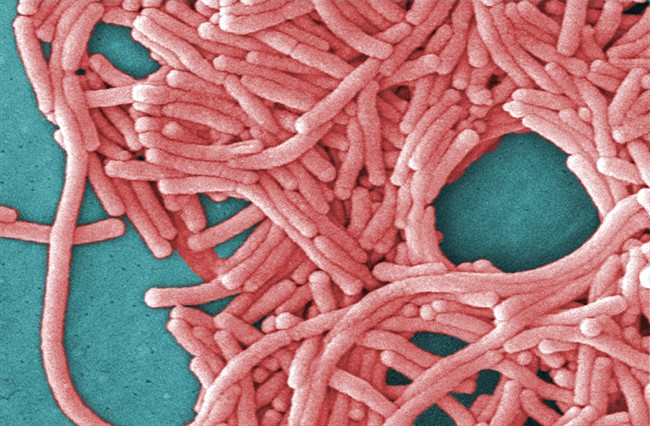HALIFAX – The Nova Scotia Health Authority, NSHA, is awaiting test results for three suspected cases of Legionnaires’ disease and is treating the cluster of cases as an outbreak as a precaution.

On Tuesday, NSHA announced a resident of a Dartmouth apartment building had tested positive for the disease. Residents at Alderney Manor on Alderney Drive confirmed to Global News that it was their apartment building.
NSHA said the four residents are currently in hospital. Housing Nova Scotia said all four lived in different parts of the building.
Vicky Lynn Isenor has lived in the building for four years. She said news of the potential outbreak is disconcerting.
“It scared me. It makes me wonder ‘Gee, I hope I don’t get it’,” she said.
Fellow resident William Jackson has also lived in the building for four years. He said the news of the positive case of Legionnaires’ has residents talking.
“They’re worried. What’s going on and stuff. I guess they’ll get it fixed eventually,” he said.
But John Brennan, who has lived in the building for three years, said he thinks the news has been blown out of proportion.
“It doesn’t concern me at all. A lot of people in here are sick from various diseases. People are dying every day,” he said.
Case confirmed earlier in the week
Dr. Gaynor Watson-Creed, the medical officer of health for the central zone of NSHA, said she received word of the confirmed case late Tuesday.
“What was unusual about it is we also heard about a cluster of other pneumonias that have not been confirmed to be Legionnaires’ yet. That actually gave us a tip off to start an investigation,” she said.
Watson-Creed said a researcher who was working on surveillance picked up on the first confirmed case and alerted authorities.
“We almost never get that opportunity when we’re dealing with an outbreak. To have all that information in front of us ahead of time puts us in an excellent position to begin in the investigation,” she said.
Alderney Manor is public seniors housing and Housing Nova Scotia said there are approximately 200 residents.
Watson-Creed said the circumstances surrounding this possible outbreak are concerning.
“Any group that has underlying medical conditions, especially those lung conditions that we do tend to see more of in a seniors population, that would be a group of concern for Legionnaires’ absolutely,” she said.
NSHA investigation underway
Watson-Creed said it can take up to 14 days for symptoms to appear. Symptoms include a fever, chills, shortness of breath and pneumonia. She said legionella is not an issue if in the water but it becomes of concern when it gets into mist. It cannot be spread from person to person.
“That’s why people get pneumonia from it because they’re actually breathing it into their lungs. That mist is created by a warm, moist environment and that’s where legionella likes to grow,” she said.
She said it takes up to a week for a suspected case of Legionnaires’ disease to be confirmed and adds that the fatality rate is approximately 15 per cent.
“In our investigation, that’s part of what we’ll uncover is how long did people have the illness, when did they first notice they had the illness. This helps us track down when they might have been actually exposed,” she said.
“We know legionella lives in water so where in the water could it be? Where could it be hiding? What are the things we can do about that?”
Watson-Creed said samples will be taken from the water as well as from the biofilm in pipes and other infrastructure in the building.
She said the confirmed and suspected cases in Dartmouth are likely not related to the outbreak in New Brunswick.
Organism is “tricky”
She said legionella is often difficult to get rid of in systems since it hides in biofilm, which builds up on the side of pipes. She said the bacteria is also resistant to chlorine.
“The trickiest thing about legionella is that this is a organization that lives everywhere. It is present in the environment because it is in our soil,” she said.
Watson-Creed said now is the time of year when legionella clusters pop up.
“We’re outside. We’re into the soil. We’re tracking it back into our houses. We’re exposing our water systems,” she said.
“Once it gets into a system, it can often be difficult to get rid of.”
Safety a priority for Housing Nova Scotia
Stephan Richard, a spokesperson for Housing Nova Scotia, said a meeting was held with residents on Wednesday to inform them of the situation in the building.
Residents are being asked to take measures to protect themselves such as taking baths instead of showers, turning off air-conditioning units and humidifiers and using boiled and cooled water to clean respiratory devices.
Richard said it is too early to say if or when any upgrades will be made to the building as a result of the confirmed case.
“Until we find out exactly what the source is and what the recommendations are from the Department of Health and Wellness, we are not going ot do anything that could jeopardize or put the safety of our residents at risk,” he said.
Richard said residents are being asked to “go about their daily lives as routinely as possible”.
He said this is the first time a potential outbreak of Legionnaires’ disease has been investigated at a Housing Nova Scotia building.
Watson-Creed said there are often two to three cases of Legionnaires’ every year in the Central zone. The confirmed case in Dartmouth is the first case of the year.
- Canadian man dies during Texas Ironman event. His widow wants answers as to why
- Invasive strep: ‘Don’t wait’ to seek care, N.S. woman warns on long road to recovery
- ‘Sciatica was gone’: hospital performs robot-assisted spinal surgery in Canadian first
- ‘Super lice’ are becoming more resistant to chemical shampoos. What to use instead




Comments